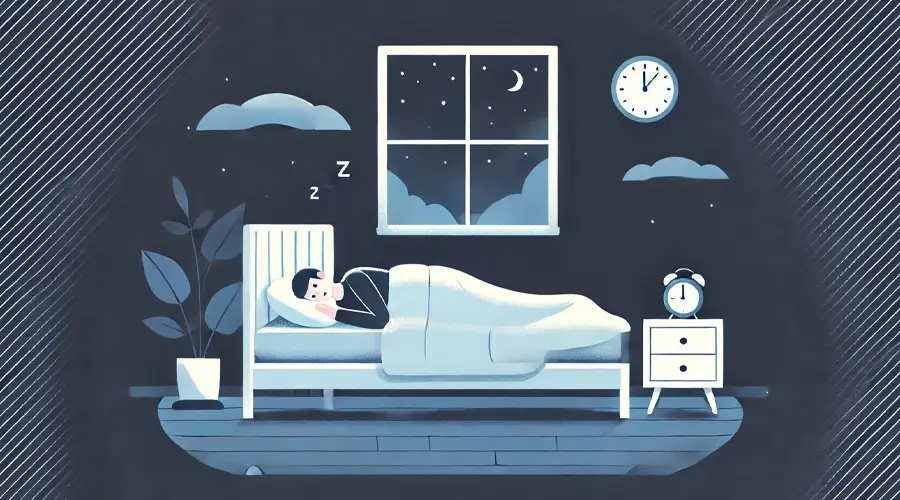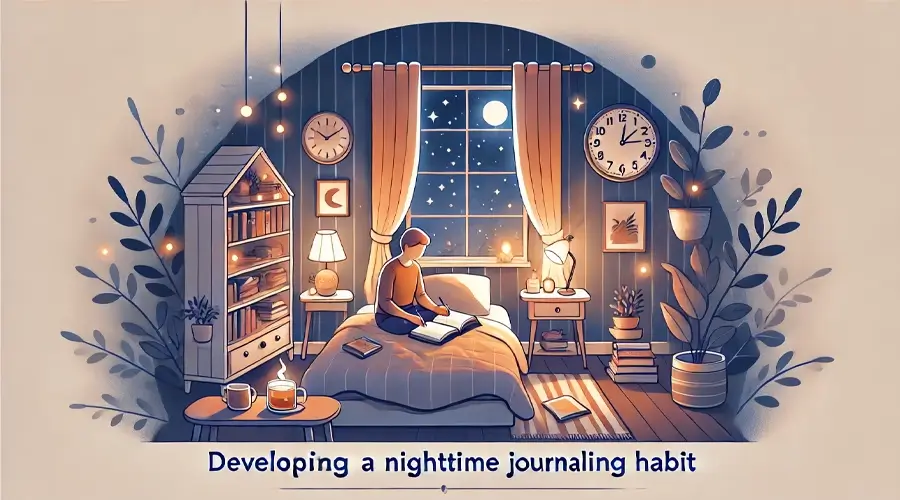It’s 1:37 a.m. You’ve been lying in bed for what feels like forever. The room is quiet, the lights are off, but your mind? Wide awake.
You’re replaying that awkward moment from earlier. You’re planning tomorrow’s tasks. You’re wondering if you texted back your friend. And now—just for good measure—you’re stressing about the fact that you’re not asleep yet.
Sound familiar?
If you’re nodding your head, welcome to the club. Millions of people in their 20s and 30s struggle with falling asleep, not because they aren’t tired—but because their minds are too busy to rest. Despite all the sleep hygiene tips we’re bombarded with—no screens, drink tea, try deep breathing—something still feels missing.
What if the solution isn’t just about what you stop doing before bed—but what you start doing?
That’s where journaling before bed comes in. It may not be the first thing that comes to mind when you think of sleep improvement, but don’t underestimate the power of a pen and paper. Writing down your thoughts, emotions, and even to-dos can help you declutter your mind and create the mental space your body needs to fully rest.
And no, you don’t have to be a “writer” to do it.
Let’s dig into how this simple practice could help you finally drift off faster—and sleep better.
Why Falling Asleep Is So Hard These Days
Falling asleep used to feel effortless when we were kids—no bedtime anxiety, no endless to-do lists. Just a pillow, a blanket, and lights out. So why, as adults, does bedtime sometimes feel like a mental battlefield?

The truth is, most of us are caught in an exhausting cycle of racing thoughts, everyday stress, and screen time that stretches late into the night. We’re scrolling through social media one minute, replying to emails the next, and before we know it—it’s 2 a.m., and our brain is still in “go” mode.
Then comes the mental checklist:
✔ Did I finish that report?
✔ What if I forget that appointment?
✔ Why did I say that weird thing in the meeting?
Our brains crave closure, and when we don’t give them a chance to offload the chaos, they keep spinning—even when our body is begging for rest.
The Modern Lifestyle Is Hijacking Our Sleep
We live in a world that celebrates productivity and constant connection. But all that mental noise comes at a price: poor sleep quality. Stress and overstimulation keep our nervous systems alert long after we’ve put the phone down or turned off the lights.
What’s more, the connection between anxiety and sleep disruption is stronger than most people realize. When we go to bed anxious or mentally overwhelmed, it can trigger a loop of shallow sleep, restless tossing, or full-on insomnia.
But here’s the good news:
There’s a low-effort, surprisingly effective way to quiet the mental clutter: journaling before bed. By taking just a few minutes to dump your thoughts on paper—fears, plans, feelings, whatever’s buzzing—you’re giving your mind permission to slow down. Think of it as emotional decluttering for the brain.
And guess what? That mental reset often leads to noticeable sleep improvement, sometimes after just a few nights.
The Science Behind Journaling Before Bed
So, what exactly happens in the brain when you put pen to paper before bed?
It turns out, journaling before bed does more than just “get things off your chest.” From a neurological perspective, writing helps calm the mind, reduce mental noise, and lower what’s known as cognitive load—the overwhelming amount of information and thoughts we try to process all at once.
When you write things down—your worries, unfinished thoughts, random ideas, tomorrow’s to-dos—you’re giving your brain permission to stop holding onto them. Think of it like taking heavy bags off your shoulders. Your mind gets lighter, quieter, and more prepared to rest.
Activating the Brain’s Default Mode Network
Research has shown that reflective writing (like journaling) activates a part of the brain called the Default Mode Network (DMN). This network is associated with self-reflection, creativity, and memory processing—all the quiet mental activities your brain naturally shifts into as you prepare for sleep.
When the DMN is activated through journaling, it helps the mind settle, transition away from high-alert mode, and enter a more introspective, restful state—exactly what’s needed for a smoother descent into sleep.
Journaling Encourages Mindfulness, Too
Another surprising benefit of writing before bed is how it subtly promotes mindfulness—the ability to be present with your thoughts without judgment. Whether you’re listing things you’re grateful for or simply venting about a tough day, you’re becoming more aware of your emotional landscape. And that awareness creates space—space that reduces stress and makes room for sleep improvement.

In other words, journaling before bed isn’t just a mental health practice—it’s a scientifically-supported tool for better sleep. All it takes is a few honest minutes with a notebook, and your brain starts doing the rest.
What the Research Says About Journaling and Sleep
Still wondering if journaling before bed actually works—or if it’s just another trendy self-care tip? Science is on its side. Several studies have explored how writing before sleep impacts mental clarity and overall sleep improvement—and the results are surprisingly powerful.
📝 The “To-Do List” Study
One standout study from Baylor University asked participants to write for five minutes before bed. Half of the group wrote about completed tasks, while the other half wrote down tasks they needed to complete the next day.
The result?
Participants who wrote to-do lists fell asleep significantly faster than those who journaled about completed tasks. Why? Because writing down future tasks offloaded mental clutter, allowing the brain to relax.
📊 On average, the “to-do list” group fell asleep 9 minutes faster—a difference similar to what some sleep medications provide.
😴 Gratitude Journaling and Sleep Quality
Another study published in the journal Applied Psychology: Health and Well-Being explored how gratitude journaling affected sleep. Participants who wrote about things they were grateful for before bed reported better sleep quality, felt more refreshed in the morning, and had fewer negative thoughts at night.
This supports the idea that focusing on positive emotions before bed helps regulate stress and improves sleep patterns.
🧠 Emotional Processing Through Writing
A 2018 study in JMIR Mental Health found that expressive writing (writing openly about your emotions or daily experiences) helps people reduce overthinking—especially when done at night. This reduction in mental overactivity plays a direct role in sleep enhancement, especially for those prone to anxiety or racing thoughts.

What to Write: Journaling That Actually Works
Okay, so you’re convinced to try journaling before bed—but now you’re staring at a blank page thinking: What the heck am I supposed to write?
Good news: there’s no “right” way to journal. The key is to find a style that fits your mental needs and supports your goal of sleep improvement. Below are three simple and powerful journaling methods that have proven benefits for better rest:
1. Gratitude Journaling
This one is all about shifting your focus before sleep. Instead of ending your day in stress or negativity, gratitude journaling helps you reflect on what went right.
Write down 3–5 things you’re genuinely thankful for—big or small. A good conversation. A hot shower. The fact that you survived the day. By focusing on positive emotions, your brain winds down in a more peaceful, content state, which leads to more restful sleep.
💡 Bonus tip: Gratitude journaling reduces nighttime rumination and boosts overall emotional well-being.
2. Brain Dump (a.k.a. Thought Unloading)
If your mind feels overloaded, this one’s for you. A brain dump is exactly what it sounds like: you write down everything swirling around in your head, with zero pressure to organize or make it sound good.
Lists, complaints, ideas, worries, questions—dump it all onto the page. This method frees up mental space, lowers anxiety, and helps prevent racing thoughts from following you into bed.
Think of it as clearing your browser tabs before shutting down for the night.
3. Next-Day Planning
Some people can’t sleep because they’re mentally rehearsing everything they have to do tomorrow. If that’s you, try using your journal to plan your next day.
List your top priorities, outline a few steps, or even time-block your morning. Giving your brain a plan makes it feel more in control—and less likely to keep you up overthinking.
💡 This style of journaling before bed helps reduce bedtime anxiety and promotes sleep improvement through mental clarity.
So, Which Style Is Right for You?
Try mixing and matching. One night, you might need a brain dump. The next, a gratitude list. Over time, you’ll figure out what calms your mind best. The beauty of journaling is that it’s flexible—and always there when you need it.
Overcoming Doubts and Excuses
Let’s be honest—starting something new, even something simple like journaling before bed, can feel weird at first. Especially if you’ve never done it before or don’t see yourself as “a journal person.”
You might be thinking:
“I don’t have time.”
“I’m not a writer.”
“What if I have nothing to say?”
Totally valid. But here’s the truth: journaling isn’t about being poetic or profound. It’s about giving your brain a safe space to unload—just like tossing your backpack on the floor after a long day.
Quick & Simple Ways to Start
If the blank page feels intimidating, try this 3-minute journaling hack:
-
One sentence about how you feel right now
-
Three things you’re grateful for
-
One thing you want to do tomorrow
That’s it. You don’t need paragraphs. You don’t even need full sentences. Bullet points, doodles, or messy handwriting? Totally acceptable. The goal isn’t perfection—it’s sleep improvement through mental release.
Not a Fan of Pen and Paper?
No problem. You don’t have to journal the traditional way to experience the benefits. There are plenty of digital tools designed to make journaling before bed easy, intuitive—and even enjoyable.
One of the most exciting options? VERBOAI.
-
VERBOAI – A smart journaling app powered by AI. Whether you don’t know what to write, feel overwhelmed, or simply want a more guided experience, VERBOAI gives you personalized prompts, calming reflections, and even analyzes your tone and mood over time to support long-term sleep improvement. It’s like having a gentle coach in your pocket, helping your mind unwind—one entry at a time.
Other apps you might like:
-
Jour – Great for guided prompts and mindfulness
-
Day One – Clean interface with photo and voice entry options
-
Reflectly – A more emotional, conversational approach
-
Five Minute Journal – Perfect if you’re super short on time
Whether you’re a tech lover or just need a little push to get started, these tools make it easier than ever to build a journaling habit that helps you sleep deeper and feel lighter.
Building a Nighttime Journaling Habit
The benefits of journaling before bed are clear—but like anything good, consistency is key. It’s not just about doing it once and expecting magic. The real transformation happens when journaling becomes a habit, integrated into your nightly wind-down routine.
Pair It with a Bedtime Ritual
The easiest way to stick with journaling is to anchor it to something you already do at night. For example:
-
Right after brushing your teeth
-
After turning off your phone
-
While sipping herbal tea
-
Before turning off the lights
By attaching journaling to an existing bedtime cue, it becomes second nature—and you’re more likely to keep doing it.

A 10-Minute Bedtime Routine for Mental Clarity & Better Sleep
Here’s a sample nighttime routine that blends reflection, relaxation, and simplicity:
-
Turn off screens – 30 minutes before bed
-
Dim the lights – and create a calm atmosphere
-
Stretch or breathe – 1–2 minutes of light stretching or deep breathing
-
Journal – spend 5–6 minutes writing (gratitude, brain dump, or tomorrow’s plan)
-
Set your intention – a calming thought or affirmation to end the day
This short, mindful ritual signals your brain that it’s time to slow down—creating the ideal mental space for sleep improvement.
A Real-Life Result (or What It Could Look Like)
Meet Sam—a 29-year-old designer who used to lie awake for hours replaying conversations, doomscrolling, and stressing about tomorrow.
Then he started journaling before bed. Just a few minutes a night. Some days it was a gratitude list. Other nights, it was messy thoughts dumped on paper.
After one week? Sam said he was falling asleep faster. His mind felt lighter. And even though his life hadn’t changed, his nights had.
“I used to think journaling was woo-woo,” Sam says. “Now it’s the best 5 minutes of my day.”
Conclusion + A Gentle Challenge
Let’s recap.
We’ve explored how journaling before bed can help calm your racing thoughts, create emotional clarity, and promote real, lasting sleep improvement. It doesn’t require fancy tools, perfect grammar, or hours of your time. Just a few honest minutes with your thoughts—and a willingness to show up for yourself.
It’s not about being a writer.
It’s about being real—with your mind, your feelings, and your sleep.
So here’s a gentle challenge:
Try journaling before bed for just one week.
Not forever. Not perfectly. Just one week of showing up at night with a notebook, your phone, or an app like VERBOAI, and writing whatever needs to be said.
See how your mind responds.
See how your sleep feels.
You might be surprised by how powerful this small nightly habit can become.



